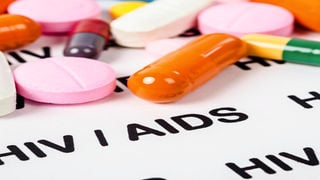
Domestic funding for HIV/Aids is emerging to be a critical factor in the fight against the epidemic.
| FotosearchNews
Premium
Agency pushes for more state funding for HIV
The government has been asked by the United States to increase its HIV funding and honour its financing commitment.
This is happening when the US President's Emergency Plan for Aids Relief (Pepfar) is planning to cut its funding to Kenya by Sh2.2 billion, accusing the country of doing very little to increase its domestic funding to the HIV fight.
According to a memo by the acting Pepfar boss, Dr Angeli Achrekar, to Acting US Ambassador to Kenya Eric Kneedler and the Kenyan Government, the donor has proposed to give Kenya $345 million (Sh39.17 billion) for this year compared to $365 million (Sh41.44 billion) in 2021.
The memo indicated that Kenya has one of the largest programmes and budgets, but falls in the bottom third when it comes to host country government co-financing.
“Now that Pepfar Kenya’s focus is shifting to sustaining its HIV impact, the co-financing commitments and follow-through need to be a priority,” she said.
Pepfar funding
Dr Achrekar said Kenya has had challenges of ensuring that HIV commodities are available to its people, and that the country should look for finances to cover the commodity gaps, and not use Pepfar funding.
“To date, the pipeline of funds is now exhausted, our commitment to commodities will not exceed the quantities initially programmed for this year,” she said.
In the letter titled Fiscal Year 2023 Pepfar Planned Allocation and Strategic Direction, it directed Kenya to start ensuring funding and allocating funds for viral load tests for children and newly-initiated clients to make use of differentiated service delivery.
She added: “It is critical for the country’s progress towards controlling the pandemic and maintaining control.”
She also warned the country against employing more staff using the donor’s money and that unnecessary spending must stop.
“Kenya should review non-service delivery spending to identify duplicative activities that can be consolidated or centralised. Staff and material spending at site should be reviewed with a preference for maintaining current levels,” she says.
She adds: “For every dollar spent at a site, Pepfar Kenya spends up to a dollar and a half on the above site according to expenditure reporting data.”
The funding from the government mostly pays salaries to health care workers that work in HIV departments.
Since 2018, the government has witnessed a decrease in HIV funding from Pepfar with no domestic increase in funding to help the sector.
HIV/Aids funds
In 2017, Pepfar gave Kenya $570 million, this was reduced by $70 million in 2018, to $500 million, and further to $370 million in 2019. In 2020, the amount slightly rose to $375 million, but dropped to $365 million in 2021 and to $345 million this year.
Pepfar contributes more than 50 per cent of total HIV/Aids funds in Kenya every year. The rest comes from the Global Fund.
Dr Achrekar also warned the country against creating barriers that prevent free entry of HIV commodities into the country, hence putting thousands of lives at stake.
She instructed the government to create a tax free environment and hasten approvals for commodities to get into the country to ensure that drugs donated to the country are not wasted or diverted to other countries, yet thousands of patients in Kenya are in dire need of them.
She said the funding level they get to support the country does not include funds to pay for unnecessary barriers.
“The stock-out of commodities Kenya experienced last year is unacceptable, every factor that led to it should be analysed thoroughly and addressed,” she said.
Wastage
“The taxes demanded before the entry of commodities into the country should be removed since the donors will not take care of the barriers. This encourages wastage and the drugs diverted into other countries,” she said.
She said many patients were hurt with the stock-out and this year, plans must be in place so that as soon as commodities arrive in the country, the patients who missed out are followed up with to be given what they requested.
These “mop up” plans, she said, should be prioritised and completed as quickly as possible.
Last year, lifesaving HIV drugs and consignments worth Sh1.1 billion donated by USAid to the government were stuck at the port of Mombasa for six months, following a tax dispute between the government and the donor.
The state demanded Sh90 million tax from a privately owned American firm, Chemonics, which had imported the consignment on behalf of USAid.
The standoff led to shortage of antiretroviral drugs and HIV testing kits across the country for almost a year, putting thousands of lives at risk.
The memo describes detailed priorities and strategies where governments should direct the funding for the Aids response in Kenya in 2022.





